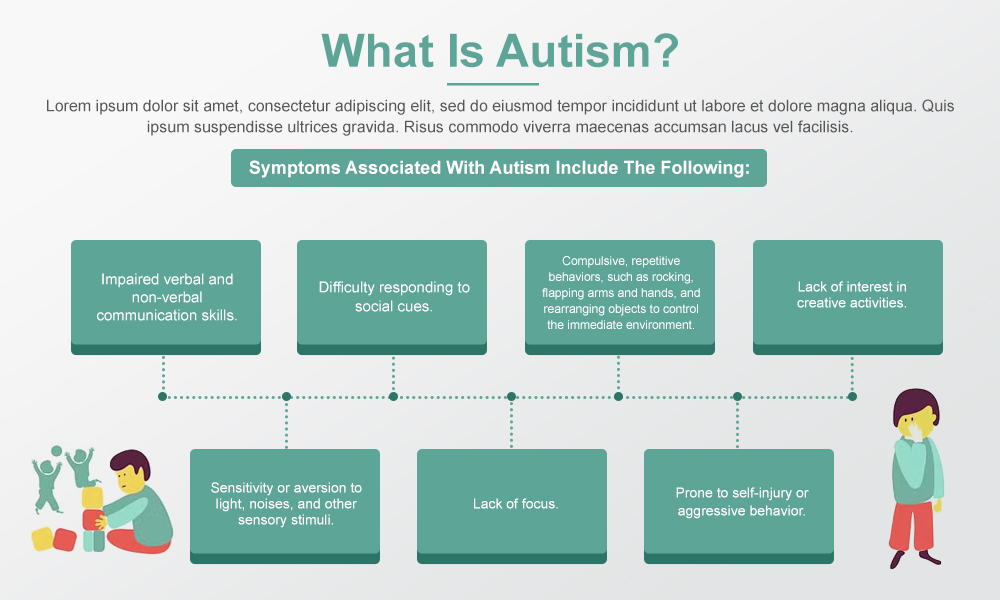Financial stress is one of the many challenges of living with autism or having a child diagnosed with the disorder. If you or your child has autism, you may qualify for disability benefits. The Social Security Administration has two programs, Supplemental Security Income (SSI) and Social Security Disability Insurance (SSDI), that pay disability benefits for people diagnosed with autism.
Obtaining disability benefits for autism depends upon whether the severity of the symptoms and other factors prove that you or your child have an autism disability that qualifies for SSI or SSDI. This blog post explains how the Social Security Administration determination process works when evaluating applications for disability benefits specifically for claimants diagnosed with autism. You’ll learn about autism, including symptoms and other information about the disorder that may be useful when applying for autism disability benefits.
What is Autism?
Autism is a neurodevelopmental disorder affecting a person’s communication and social interaction skills. Researchers believe the disorder exists from birth with a diagnosis usually occurring by the time a child is three years old.

Symptoms Associated With Autism Include The Following:
- Impaired verbal and non-verbal communication skills.
- Difficulty responding to social cues.
- Compulsive, repetitive behaviors, such as rocking, flapping arms and hands, and rearranging objects to control the immediate environment.
- Lack of interest in creative activities.
- Sensitivity or aversion to light, noises, and other sensory stimuli.
- Lack of focus.
- Prone to self-injury or aggressive behavior.
Researchers now know that autism is not just one type of condition. Instead, several developmental conditions reflect differing impairment levels depending on the symptoms a child or adult displays.
For example, Asperger’s syndrome is a developmental disorder. An adult or child with Asperger’s may exhibit limited social skills and interests, engage in rigid and limited routines, and display compulsive and repetitive behaviors. Medical professionals now recognize Asperger’s syndrome as a mild form of autism, so a child or adult would be diagnosed as having an autism spectrum disorder instead of Asperger’s.
According to the Centers for Disease Control and Prevention, parents usually consult medical professionals when their child shows signs of delayed development, typically within the first three years after birth. No medical tests exist to help doctors to diagnose autism spectrum disorder. Instead, they rely on the behavior and developmental history of a child to arrive at a diagnosis.
Once diagnosed, autism is not curable, but treatments are available to improve the quality of life for children and adults with autism spectrum disorder. Different prescription medications and therapies exist to improve communication skills and cope with anxiety and behavioral issues that someone with autism experiences.
The level at which a person functions is important when applying for disability benefits through the SSI and SSDI programs. Social Security focuses on the ability of a person to perform work-related activities to determine whether applications based on autism qualify for disability benefits.
Is Autism A Disability?
Autism may affect a person’s ability to work, learn, and function independently without assistance. An autism spectrum diagnosis does not automatically mean the person is disabled and eligible for Social Security disability benefits.
SSI and SSDI each pay disability benefits to people with an autism spectrum disorder. Both programs require that you be disabled according to the definition used by the Social Security Administration. You also need to meet their non-medical requirements.
Non-Medical Requirements To Qualify For SSI
SSI does not require that you have a work history to qualify for benefits. It is a need-based program intended to assist people with low incomes and limited resources without regard to their work history.
The monthly SSI benefit payment of $914 for an individual and $1,371 for couples in 2023 is to assist with purchasing food and shelter. Resources you own may not exceed $2,000 in value for an individual and $3,000 for couples. The reasoning is that resources can be used to acquire food and shelter, which reduces the need for assistance. However, only some resources count toward eligibility.
Resources That Do Not Count For Purposes Of SSI Eligibility For Autism Disability Benefits Include:
- A home and the land it is on, provided you use it as your primary residence.
- One motor vehicle used by you or a household member for transportation.
- A life insurance policy as long as its value does not exceed $1,500.
- Household goods
- Personal effects, including wedding and engagement rings.
- A family burial plot.
The list of excluded resources is quite extensive, but what you do with a resource can affect whether or not it continues to be excluded. For example, if you own a home and live in it as your principal residence, its value is excluded. It loses its status as an excluded asset once you move out. A consultation with a disability lawyer at the Clausen Law Firm, PLLC, is an excellent source for advice and guidance about meeting the requirements for SSI disability benefits.
Non-Medical Eligibility Requirements For SSDI
Adults who have compiled a work history at jobs or through self-employment may qualify for disability benefits through the Social Security Disability Insurance program. Applicants must have paid Social Security taxes on their earnings or self-employment income to be eligible for SSDI benefits.
SSDI is not a need-based program like SSI, so what a person owns or their income is generally not a factor in determining eligibility. However, someone earning more than $1,350 monthly for non-blind individuals and $2,260 monthly for blind individuals is engaging in substantial gainful activity (SGA). The ability to engage in SGA means that a person is not disabled. If you work while applying for SSDI benefits, speak to a disability lawyer at Clausen Law for advice about how earnings may affect your eligibility.
A person with autism spectrum disorder may not have a work history to qualify for SSDI benefits. Still, disability benefits may be available to them as the adult child of a parent who qualifies for SSDI benefits. An adult child must be at least 18 years old with a disability that began before 22 years of age.
At least one of the parents of an adult child must be receiving Social Security retirement or SSDI benefits. A disabled adult child may also apply for SSDI benefits through the Social Security account of a deceased parent. Benefits continue for as long as the adult child is disabled based on the disability criteria Social Security uses for adults. Marriage of the disabled adult child may affect eligibility, so speak to an autism disability lawyer at Clausen Law.
Proving An Autism Disability Prevents Someone From Working
A diagnosis that a person has autism spectrum disorder is not enough on its own to qualify for disability benefits. According to the definition used by Social Security when reviewing applications for disability benefits, a person must have a medically determinable physical or mental health impairment or combination of impairments that have lasted or is expected to last for at least 12 months or result in their death. The impairments also must be severe enough to prevent the person from engaging in substantial gainful activity.
Social Security maintains a listing of impairments, commonly referred to as the “Blue Book.” It contains lists of impairments and the evidence required to prove a person is disabled. Autism is listed in Section 12.10 of the Blue Book.
To meet the listing for adults, a person must show they have the following:
- Pronounced difficulty interacting socially
- Impaired communication skills
- An inability to participate in creative activities
- Limited interest and participation in varying activities
Applicants also must prove their symptoms cause extreme limitation in one or marked limitation in two of the following areas:
- Understanding, remembering, or applying information
- Interacting with others
- Concentrating, persisting, or maintaining pace
- Adapting or managing oneself
To meet the listing for children, the following must be proven:
- Pronounced difficulty in interacting socially
- Impaired communication skills
- An inability to participate in creative activities
- Limited interest and participation in varying activities
Proof is required to establish that the symptoms cause a child to experience a marked limitation in at least two or extreme limitations in one of the following areas:
- Acquiring and using information
- Attending and completing tasks
- Interacting and relating with others
- Moving about and manipulating objects
- Caring for yourself
- Health and physical well-being
If you do not meet the listing criteria, you may still qualify for benefits if you can show that your autism prevents you from performing any substantial gainful activity (SGA). SGA is work that earns more than a certain amount per month. In 2023, the SGA limit is $1,350 for non-blind individuals and $2,260 for blind individuals.
Contact A Disability Lawyer For Autism Disability Benefit Assistance
Autism disability can be a challenging condition that affects a person's ability to function socially and economically. However, Social Security offers disability benefits to assist people with autism and their families cope with the financial issues of living with a disability.
At the Clausen Law Office, we understand your difficulties and want you to know we’re here to help. Whether you need a disability lawyer to assist with the application process, appeal an adverse decision, or answer your questions about how the process works, contact Clausen Law for a free consultation and case evaluation.


